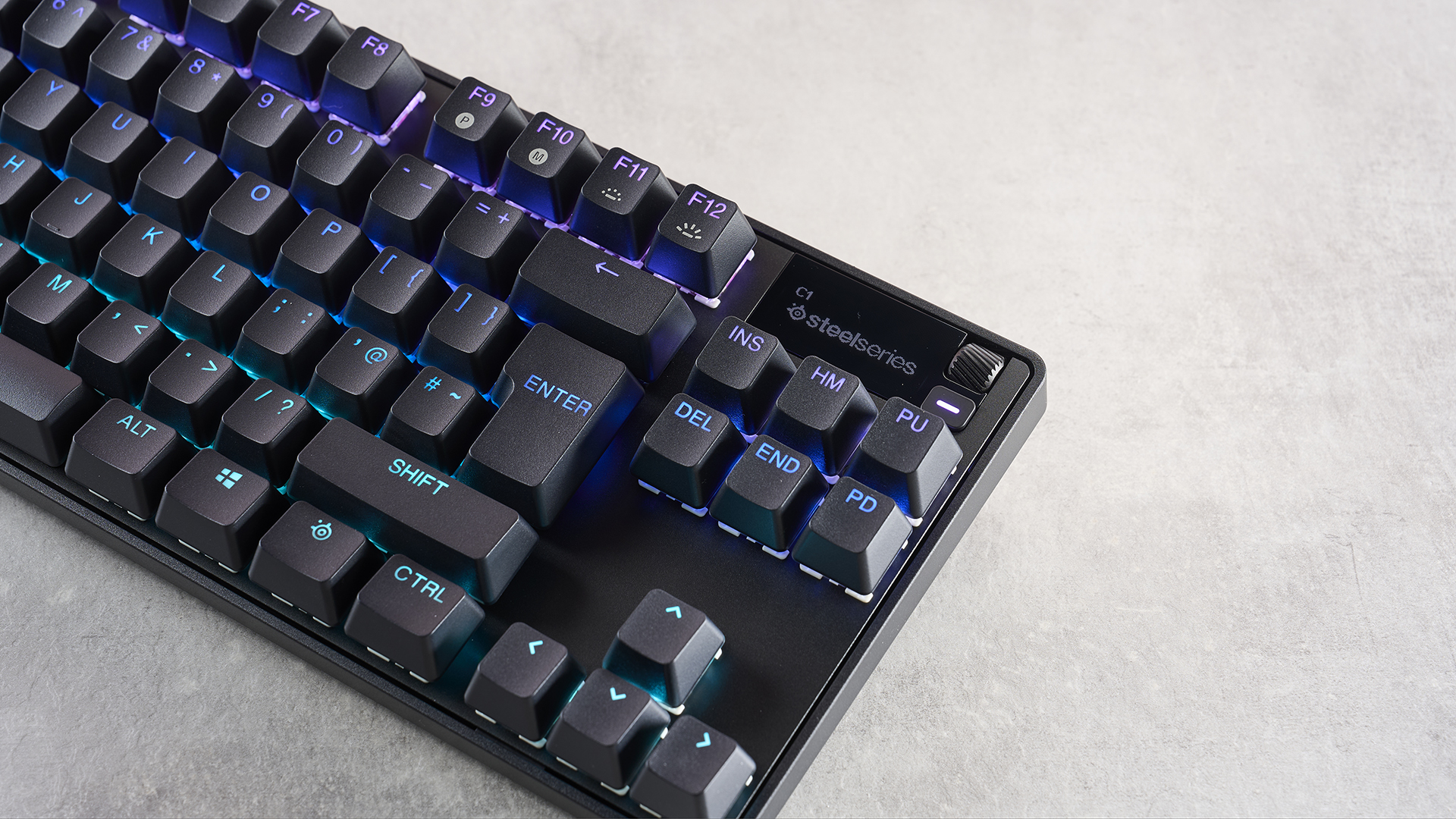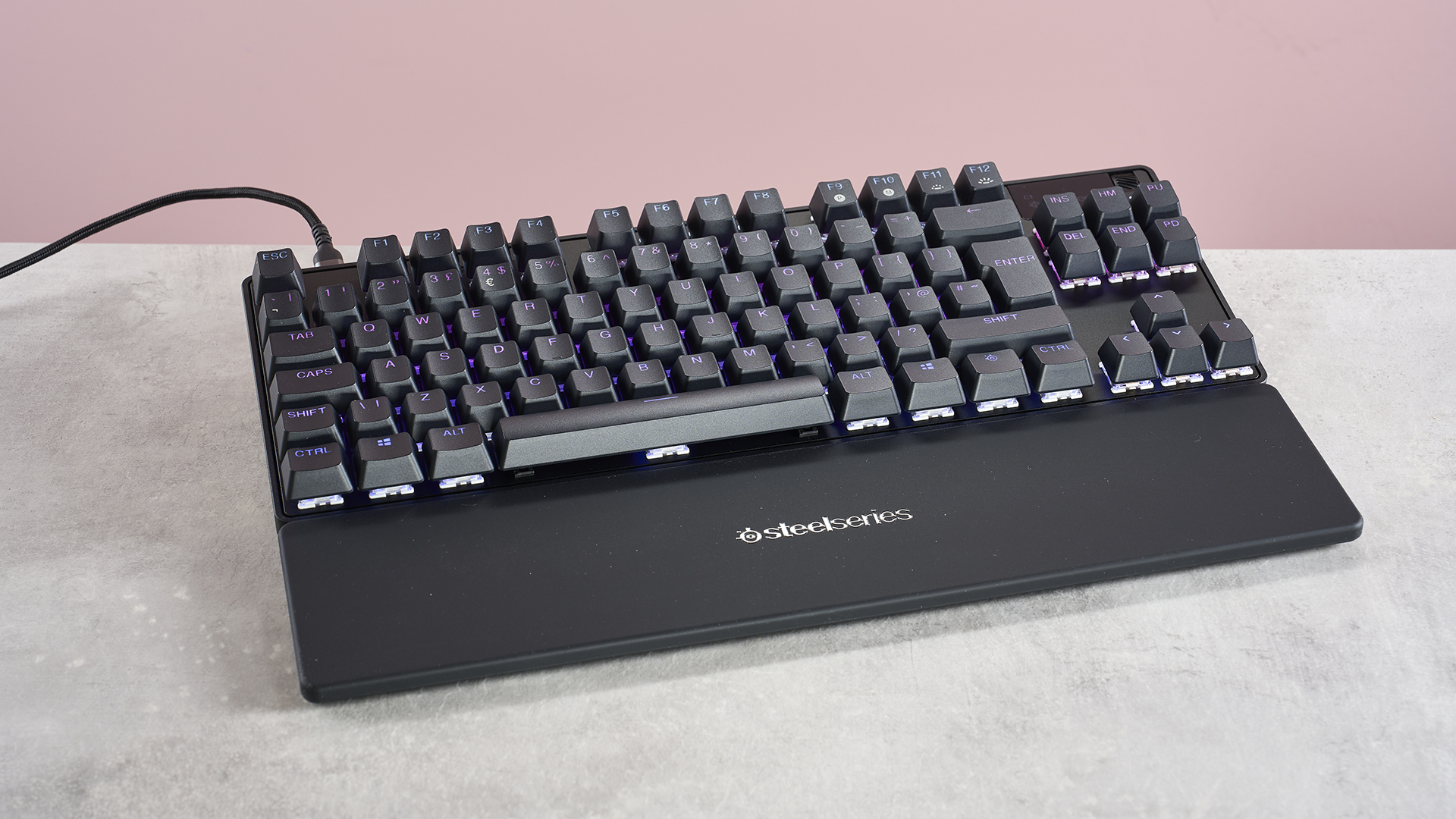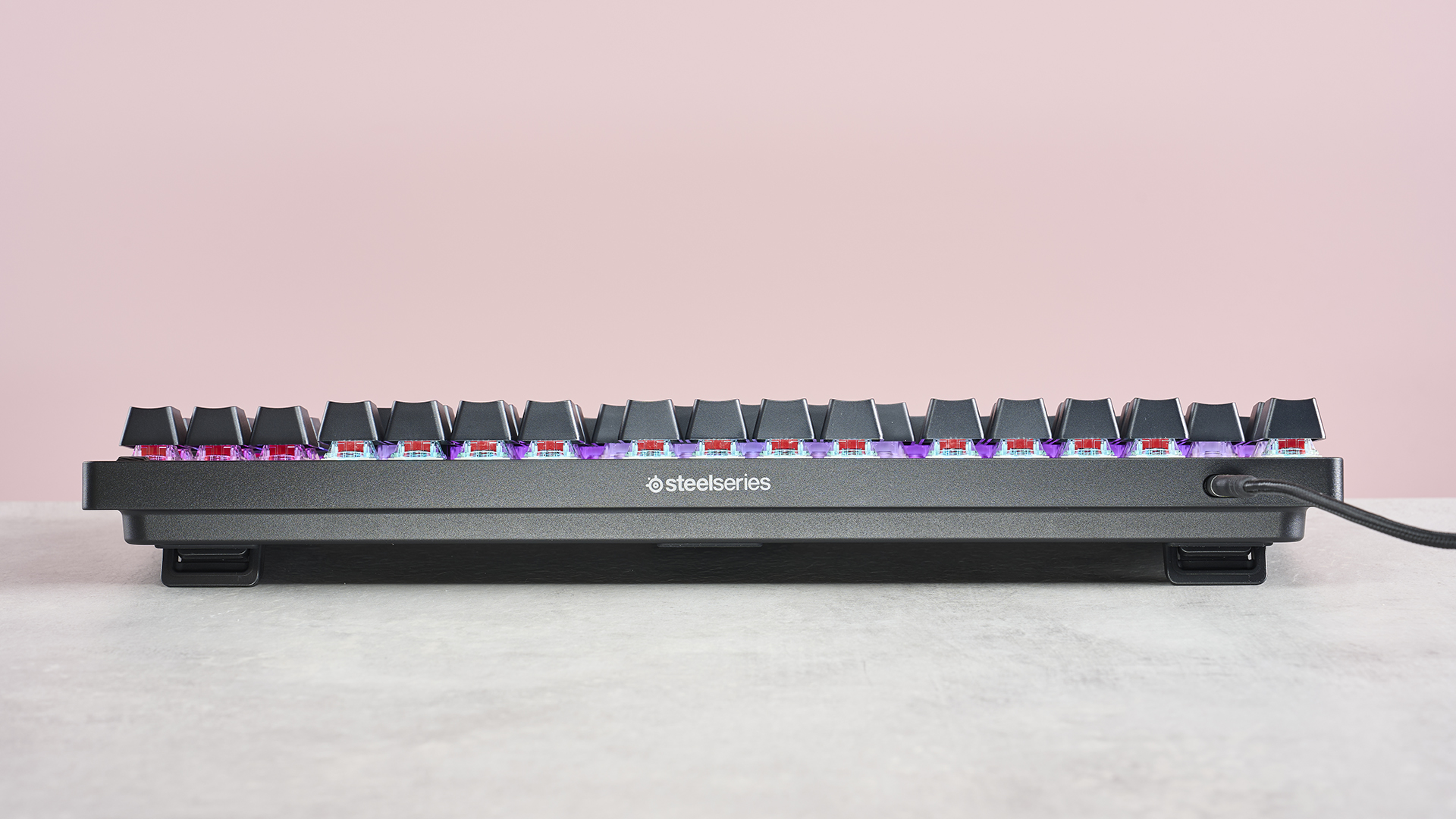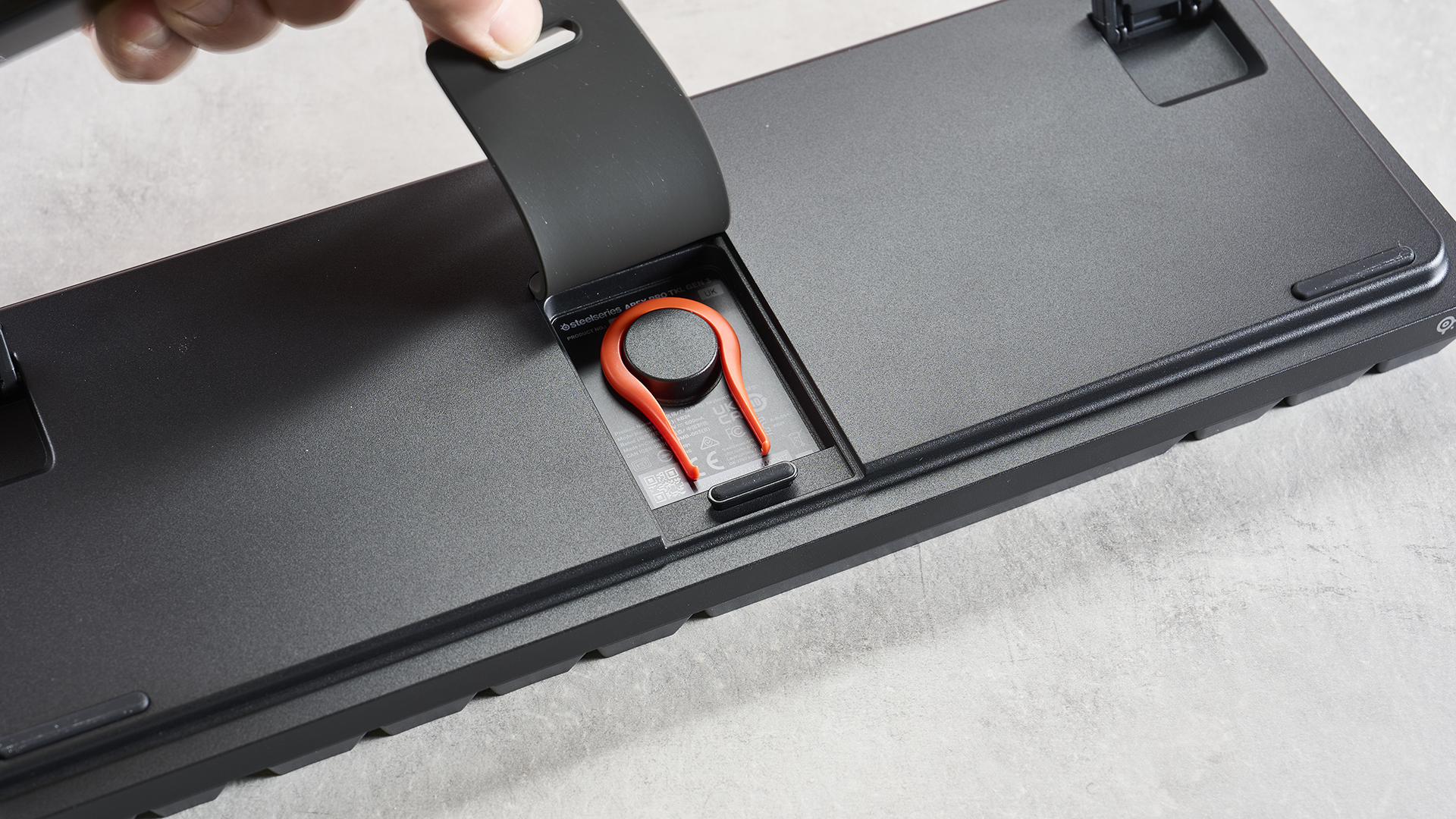SteelSeries Apex Pro TKL Gen 3 review: a super-solid analog gaming keyboard with top performance
SteelSeries Apex Pro TKL Gen 3: one-minute review
The Steelseries Apex Pro TKL Gen 3 is a premium gaming keyboard with analog switches, designed to provide the most accurate and tweakable gaming experience possible.
It certainly looks the part: its understated appearance doesn’t scream gaming prowess, but when you peer further, the quality is evident from every angle.
The chassis is relatively thick but not as weighty as you might expect, and it feels solid and expertly put together, easily among the best gaming keyboards around. The same is true of the wrist pad and the stock double-shot PBT keycaps, which have a slight but smooth texture that’s satisfying to touch.
The inbuilt Smart Screen sits in the top right corner, and can be used to select profiles, change the global actuation point and toggle Rapid Trigger. It can also be customized to display information pertaining to your system or popular games and apps. You can even upload your own images and GIFs too.
Further customizations can be made via Steelseries peripheral software, GG. Here, you can tinker with the actuation points further, on a global or key-by-key basis. You can also set functions to trigger on press or release, and add two binds to a single key, with each triggered at different actuation points of your choosing.
It’s a shame, though, that GG provides no visual feedback when making such adjustments, and there’s no option to emulate the joysticks or triggers of a controller, as can be done on some other analog keyboards, such as the Turtle Beach Vulcan 2 TKL Pro.
However, the gaming performance of the Apex Pro makes up for this omission. The switches are extremely responsive yet offer enough feedback to make hitting actuation points easy. The relatively compact layout also makes the bottom row accessible, as does the sloped nature of these keys. All keycaps are also nicely indented, making for secure presses. The only gripe I have is with the short, flat wrist rest, which caused my palm to hang off the edge when in the WASD position.
I didn’t find the Apex Pro to be as amenable for typing. However, I generally prefer shallow keycaps to glide around on, so those who prefer thicker keycaps may have no issue here.
The Apex Pro is expensive, costing the same as the Razer Huntsman V3 Pro, another analog offering. But with the high price tag comes supreme build quality and performance, and although it misses out on a few analog tweaks, it’s still well worth your consideration.

SteelSeries Apex Pro TKL Gen 3 review: price and availability
- $219 / £209 (about AU$336)
- Available now in black
- Same price as Razer Huntsman V3 Pro Tenkeyless
The Apex Pro TKL Gen 3 costs $219 / £209 (about AU$336) and is available now. It comes in one colorway, black. It also includes a wrist rest and a keycap puller, with Steelseries selling replacement keycaps on its website.
Unsurprisingly, it’s less expensive than the wireless variant, which costs $269 – but as well as ditching the wires, that model offers multiple connectivity modes, meaning you can easily switch it between multiple devices.
The Apex Pro is certainly towards the top end of the wired gaming keyboard market. It’s the same price as the Razer Huntsman V3 Pro Tenkeyless, for instance, which uses Hall-effect analog technology as well. That board can also be tweaked using Razer Synapse, the brand’s excellent, feature-packed peripheral software.
If you’re after a more budget-friendly analog keyboard, then the Turtle Beach Vulcan 2 TKL Pro is a possible contender. Unlike the Apex Pro, it offers controller emulation, although its switches aren’t as precise as we would’ve liked for this purpose. Even though it has its issues, it’s still one to consider.
Value: 3 / 5
SteelSeries Apex Pro TKL Gen 3 review: specs

SteelSeries Apex Pro TKL Gen 3 review: design and features
- Superlative build quality
- Useful inbuilt screen
- Some analog tweaks missing
The Apex Pro is a fairly imposing slab, with a thick yet sleek chassis, and its muted looks belie its gaming intentions; the RGB lighting is about the only giveaway in this regard.
The build quality is where the Apex Pro really stands out, though. It’s quite weighty, although not as heavy as you might expect, but every material and joint is exquisite. There’s also a handy compartment underneath housing the keycap puller, with a rubber flap to close it that works well.
The double-shot PBT keycaps feel premium to the touch, with a slight yet smooth texture. The overall layout is reasonably compact, but I didn’t have any issues with mispresses.
The Apex Pro also features Steelseries’ own modifier key, called the Meta key. This allows you to perform various shortcuts, such as adjusting the actuation point and selecting profile slots.
Such alterations can also be made via the Smart Screen. This uses a black and white OLED display, with navigation controlled via a scroll wheel and a small button below – both of which are just as well engineered as the rest of the Apex Pro.
You can set the global actuation point from anywhere between 0.1mm and 4mm, and toggle Rapid Trigger. The Smart Screen can also be used to display certain system information, including workloads for the CPU, GPU and RAM, which is very useful. In-game information can be displayed too, with many popular games having their own default layouts, including those for Counter-Strike 2, Minecraft, and League of Legends. You can even upload your own images and GIFs to display.

Further actuation settings can be adjusted in SteelSeris’ GG software. You can change the actuation of individual keys, and set keys to trigger on press or release. There’s also a dual actuation mode, letting you bind two functions to a single key, each triggered at certain actuation points of your choosing.
Other rebinding options include those for common shortcuts, media playback and system-level functions, although there aren’t as many on the latter front as some other peripheral tools offer. You can also customize the information the Smart Screen displays with a pleasing amount of depth and detail, selecting the timings for when certain information is displayed and what triggers it.
In Counter-Strike 2, for example, you can view your health, as well as your K/D ratio at the end of each round. As well as games, some apps are also integrated, such as Discord, which can display messages.
Overall, GG is easy to navigate and responsive. One aspect that is disappointing, though, is the lack of visual feedback when adjusting settings, which would’ve been useful when setting actuation points to see how your inputs actually translate in real time.
Design & features: 4 / 5
SteelSeries Apex Pro TKL Gen 3 review: performance
- Excellent keycaps and switches
- Actuation points easy to hit
- Wrist rest issues
Put simply, the Apex Pro is a joy to use. The damping of the switches is superb, feeling incredibly satisfying to use while still being snappy enough for fast movements. The indentations of the keycaps also makes them secure and easy to use, and the bottom row is easy to hit with your thumb and little fingers, thanks to the slope of these keys and the aforementioned compact layout.
Hitting certain actuation points is also much easier than I’ve experienced with other analog keyboards, as there’s enough feedback to get a good feel as to how far down you’ve pressed. Rapid trigger also works brilliantly, letting you make those twitchy movements even quicker, by dynamically raising the actuation point when repeated presses are registered.

My chief nag from an ergonomic standpoint, though, is with the wrist rest. Given the aforementioned thickness of the Apex Pro’s chassis, I found the rest was definitely needed. However, since it’s quite short and provides very little slope, I found that the edge of my palm would hang awkwardly off the end when in the WASD position.
Also, when it comes to typing, I didn’t find the Apex Pro to be easiest to use. However, I should say that I mostly prefer shallow, laptop-style keyboards, as I find them easier to glide around on, which the stock keycaps on the Apex Pro are not particularly conducive to. But if you’re someone who prefers thicker keycaps for typing, then you’ll likely not have an issue here.
Performance: 4.5 / 5
Should I buy the SteelSeries Apex Pro TKL Gen 3?
Buy it if…
You want precise analog control
The analog switches are a dream, providing plenty of feedback for accurate actuation-point hitting.
You want the best gaming performance
Aside from that analog control, the switches are snappy when needs be, so there’s no gaming situation that catches it out.
Don’t buy it if…
You want to use it with multiple devices
Since there’s only a wired connection, you can’t easily hotswap between multiple devices, as you can with the wireless variant.
You want to emulate a controller
Despite the analog switches, you can’t emulate controller joysticks or triggers (not natively anyway).
SteelSeries Apex Pro TKL Gen 3 review: also consider
Razer Huntsman V2 Analog
If you have your heart set on an analog keyboard, then the Razer Huntsman V2 Analog is a worthy choice (it’s our pick as the best gaming keyboard around, after all). With its excellent performance and myriad of customization options courtesy of Razer Synapse, you can’t go far wrong with this board. And since the release of version 3, the V2 can be found for a good price. Read our Razer Huntsman V2 Analog review.
SteelSeries Apex Pro TKL Wireless Gen 3
For $50 more, you can get the wireless version of the Apex Pro TKL, which helps to eliminate the clutter from your desk, and allows you to do some sofa gaming too. And since it features Bluetooth and wired options in addition to the 2.4GHz dongle, you can use it with multiple devices and switch between them with ease.
How I tested the SteelSeries Apex Pro TKL Gen 3
- Tested for several days
- Used for gaming, work, and general use
- Over 10 years of PC gaming experience
I tested the Apex Pro for several days and used it to game, work, and browse. I used both with and without the included wrist rest.
I played games such as Counter-Strike 2, which is a great test for a keyboard’s responsiveness and accuracy. I also made sure to try out as many features as possible, and tinker with as many settings as I could using the GG software.
I have been PC gaming for over a decade, and I have used plenty of keyboards during that time. I have also reviewed a number of keyboards with varying price tags, sizes, and switch types.
- First reviewed November 2024
- Read more about how we test
0 comments:
Post a Comment